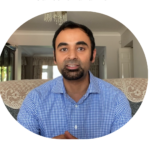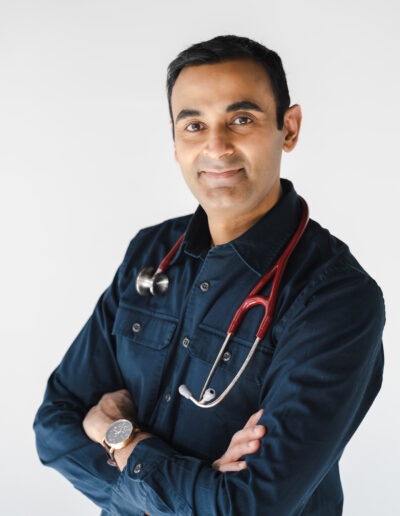New research published last week in the Journal of Modern Medicine, which analyzed a large number of physicians according to age, sex and race, showed that older white male doctors (age greater than 60) in a number of different specialties, overwhelmingly had better patient outcomes and patient satisfaction, than any other demographic. For a full breakdown of these staggering results and the authors’ conclusions, you can read further here…
…have your eyes popped out yet or is your heart racing in disbelief at this study? Before you go looking for this research online, let me tell you that the above paragraph is entirely made up. But I want us to imagine for a moment that there was a study done like this, that specifically looked at patient outcomes and satisfaction by the age, sex, and race of the physician (which is a really bad idea for a study, but that’s another story). Supposing this study was done at a large academic medical center, with whatever hypothesis the study designers had in mind. They conducted extensive research and it showed the above findings.
I speak as a younger male doctor of color, who obviously wouldn’t like seeing this result (and to be honest, judging by my own experience, I would not at all be surprised if such a study found that it was actually younger female doctors from ethnic minorities who provided the best care!). However, let’s stick with a scenario where the study showed that older white male doctors did indeed have the best patient outcomes. Do you think it would be published? I have little doubt that it would not be, and instead be immediately suppressed and tossed away.
This is a troubling scenario on multiple different levels, but is a question that gets to a core concern we are facing in medicine, science, and academia right now—one which is traversing the western world and being voiced by multiple academics across the country. How do we deal with study results that go against the cultural climate or what we deem as “political correctness”? If such a study showed that younger female ethnic minority doctors provided the best care, there is little doubt that medical (scientific) journals would be lining up to publish it, and the headlines would also probably be plastered across the mainstream news. How then, can it be right that a result from the same study which doesn’t match what we’d like to hear, would never have been released or published in the first place. Or worse still, if it did get published, its authors (who may have even themselves been hoping for a different result) be publicly shamed and even risk being fired. What does that say about the type of society we have become over the last several years? Fear, intimidation and suppression of academics may have had its place in the Middle Ages and 1930s Europe, but this is America in 2020.
Science is about seeing all the data. It’s about proposing different theories and having rigorous debate. It’s about asking questions. If a study showed the above findings, the next logical step would be to ask why it had occurred. Is it because those older white male doctors had the most experience? Is it because they practiced in wealthier areas? Is it because they had access to better infrastructure?
As doctors and scientists we are not here to ignore and shun data that we don’t like to hear, or form mobs against those who publish it or propose alternative theories to our own. We should never be so delicate and internally weak that we only want to hear what suits us or seems politically acceptable, and silence everyone else. I would certainly want to see any study result, no matter how uncomfortable it made me. It is lamentable that the medical community, no doubt driven in large part by the mainstream and social media climate, has fallen into this trap. From other major health issues to even, yes—COVID-19—we have increasingly become unable to respectfully and scientifically debate like we once used to. Ultimately if we carry on like this, the general public will not only lose faith in the medical profession, but also lose out themselves.
Almost 400 years ago, a very wise Italian gentleman called Galileo Galilei suffered an inquisition and ridicule for going against the acceptable social narrative at the time, by proposing that the earth revolves around the sun. He was forced to apologize and recant his theories, his published work was banned, and he spent the rest of his life under house arrest. Humans are by nature, a group species that doesn’t want to be challenged once a prevailing school of thought or cultural hold occurs. That is something which is sadly intrinsic within us and isn’t going to change. It has happened time and again throughout history, and the only thing that will change are the circumstances in which it occurs. The best we can hope for are fair laws and a freedom-valuing framework that protects us. Intelligent people and evolved societies should always be up for hearing everything out and respectful open debate. And scientists and doctors must always be the ones leading that fight.
 Suneel Dhand is a physician, writer, and vlogger. He is Co-Founder at DocsDox. Follow him on YouTube and Instagram.
Suneel Dhand is a physician, writer, and vlogger. He is Co-Founder at DocsDox. Follow him on YouTube and Instagram.


I have to respond to this one Suneel…
What you say about research findings is true and it needs to be a major contributor to improvement in medical practice and patient safety.
Yes, research is important but the emphasis on data is the confounding variable that is impairing medical practice. It is replacing human interaction by testing, testing and more testing. And, little time is spent with the human interaction that might make older docs a little wiser and better practitioners? These geezers used their judgement and created relationships instead of being overwhelmed with research findings. That is not to say that the research available is accurate, mind you.
I guess if you all had greater interest in your patients and their welfare, there would be less concentration/warfare about who is publishing what and what is the latest study. That race for notoriety and fortune is a greedy master.
We patients have been left out of the equation.
BTW, have you noticed that many of the family docs (not the super-duper docs) are graduates of DO schools? The question then is what are the elite medical schools doing differently that those grads want to go into specialization and not family practice?
Random thoughts.
In response to Sue’s comment, it’s a good idea to read the article before responding.